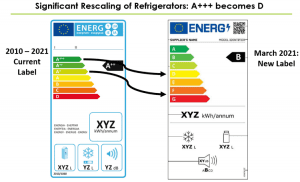
In October 2019, the European Commission adopted new regulations to promote energy-efficient, sustainable appliances and equipment across the European market. Together with energy labeling requirements adopted in March, the sweeping package of regulations is expected to avoid 331 million tons of CO2 cumulatively by 2030 and save each European household an average €150 (US$165) annually on energy bills.
The new rules were finalized under the EU’s Ecodesign Directive. They will reduce electricity consumption by 167 TWh per year by 2030, equivalent to 5 percent of the region’s total residential electricity use today, and require easy product reparability and recyclability in accordance with the EU’s Circular Economy Strategy.
CLASP supported the package over the course of five years with inputs on testing, market data and international best practices, as well as analysis of the costs and benefits associated with various levels of policy ambition for lighting, televisions, computer monitors, commercial signage, residential and commercial refrigerators, and transformers. Europe team members Marie Baton and Michael Scholand supported development of nine ecodesign and energy labeling policy measures that together represent 87 percent of the annual carbon reductions in 2030.
Expanding the package to new products
In September 2024, the EU further required smartphones and tablets in line with the Ecodesign and Energy Labelling regulations with CLASP playing an instrumental role. Starting in June 2025, these devices must also label product energy efficiency, ease of repair, battery lifespan, resilience against dust and water, and resistance to accidental drops. The rules will save about one-third of the current primary energy used by these products every year by 2030 and avoid 53 metric tons of carbon emissions by 2040.
To make the case for the new rules, CLASP, together with Right to Repair Europe, published original research demonstrating the challenges EU residents face in repairing their devices due to limited options that only offer repairs for certain key parts. Their report highlighted the challenges EU citizens face in repairing their devices, due to limited options imposed by Original Equipment Manufacturers (OEMs) that only offer repairs for specific key parts.
CLASP found that limited repair options drive consumers to purchase new smartphones and tablets. This ultimately shortens the lifespan of devices and contributes to increased electronic waste, which threatens the repair ecosystem and undermines resource efficiency goals. Following our recommendations, the Ecodesign Regulation comprehensively addresses factors that limit product lifespans and hinder recycling. It ensures the accessibility of spare parts, encourages ease of repair, enhances reliability and promotes second-hand markets.
